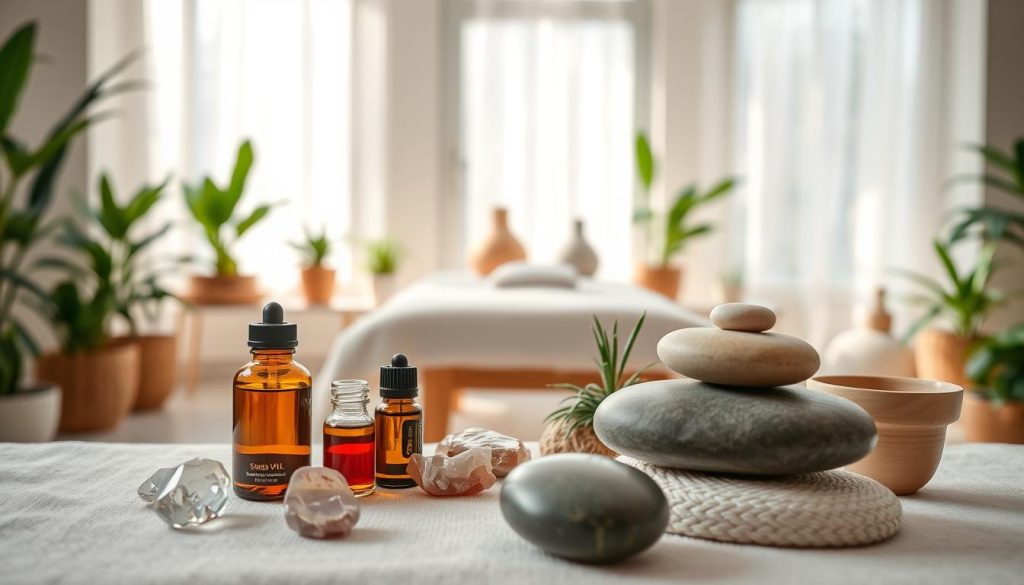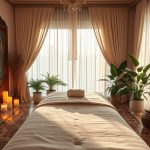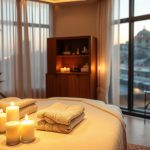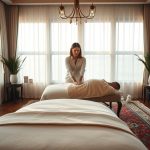Ever thought about reducing stress without meds? Many are turning to alternative health therapies and natural relaxation methods. They are finding ways to beat stress and anxiety without pills. Through engaging the body and mind, these non-pharmacological stress relief methods boost well-being. They also help you steer clear of side effects from long-term medication use.
We will explore five natural and powerful relaxation methods. These methods mix the perks of alternative medicine with massage therapy. For those fighting chronic stress or looking for a healthier way of life, these strategies are game changers.
Key Takeaways
- Alternative medicine and massage offer natural ways to relax and reduce stress.
- Non-pharmacological approaches can help avoid the side effects of medications.
- Engaging both body and mind holistically promotes overall well-being.
- Techniques include autogenic relaxation, deep breathing, and specific massage therapies.
- Massage therapy can significantly alleviate stress, pain, and muscle tension.
- Natural relaxation methods improve sleep quality, mood, and focus.
- Explore various massage techniques for targeted benefits and enhanced relaxation.
Introduction to Relaxation Techniques for Stress Relief
Relaxation techniques are key in handling stress well. These methods let you deal with stress better, boosting your health. You can enjoy life more by learning deep breathing, mindfulness, and more.
Deep breathing stands out as a top way to relieve stress. It helps calm your mind and body by bringing in more oxygen. Doing deep breathing often can help you deal with stress easily.
Visualization is another great method for finding calm. You picture a peaceful place in your mind. This helps you focus away from what’s stressing you and relax mentally.
Mindfulness meditation is also really helpful for stress. It’s about living in the moment and understanding your thoughts without judging them. Doing mindfulness often can change how you see stress and lower it.
Here’s a quick look at some benefits of these relaxation methods:
| Technique | Benefit |
|---|---|
| Deep Breathing | Lessens anxiety, betters oxygen flow, and calms the mind |
| Visualization | Moves focus from stress, brings mental peace, and boosts positivity |
| Mindfulness Meditation | Keeps you in the now, cuts down stress, and helps control emotions |
Adding these methods into your day can help you handle stress better. You will feel better overall.
The Role of Massage in Reducing Stress and Anxiety
Massage therapy is a great way to help reduce stress and anxiety. It uses different massage therapy techniques to offer physical, mental, and emotional relief. This kind of care can help you feel better all around.
Getting massages regularly plays a big role in lowering anxiety through relaxation. Let’s dive into these benefits and the massage therapy techniques available.
Benefits of Massage Therapy
Massage therapy offers many advantages, like easing muscle tension, boosting blood flow, and helping with mental focus. Below are the key benefits:
- Physical Relaxation: Frequent massages relax your muscles and ease tension, helping to relax your body.
- Mental Clarity: Better blood circulation and relaxation methods lead to clearer thinking and improved focus.
- Improved Circulation: Massages increase blood flow, which brings more oxygen and nutrients to your muscles and vital body parts.
“Massage can help the body enter a state of relaxation, facilitating numerous health benefits including stress reduction and mental clarity.”
Types of Massage Techniques
There are many massage therapy techniques to meet different needs. They make massage a great choice for managing stress in a way that works best for you. Here are some main styles:
| Type of Massage | Description | Key Benefits |
|---|---|---|
| Swedish Massage | A gentle technique using smooth, gliding strokes to promote relaxation. | Reduces muscle tension, improves circulation. |
| Deep Tissue Massage | Targets deeper muscles to relieve long-standing pain and tension. | Helps with chronic pain, releases tight muscles. |
| Reflexology | Uses pressure on certain points of the feet, hands, and ears. | Boosts relaxation, helps organs work better. |
| Shiatsu | A Japanese method that applies finger pressure to balance energy. | Lessens stress, increases energy. |
Trying out various massage therapy techniques can give broad relief. From lowering anxiety with massage to improving overall health. By exploring these methods, you can greatly boost your well-being.
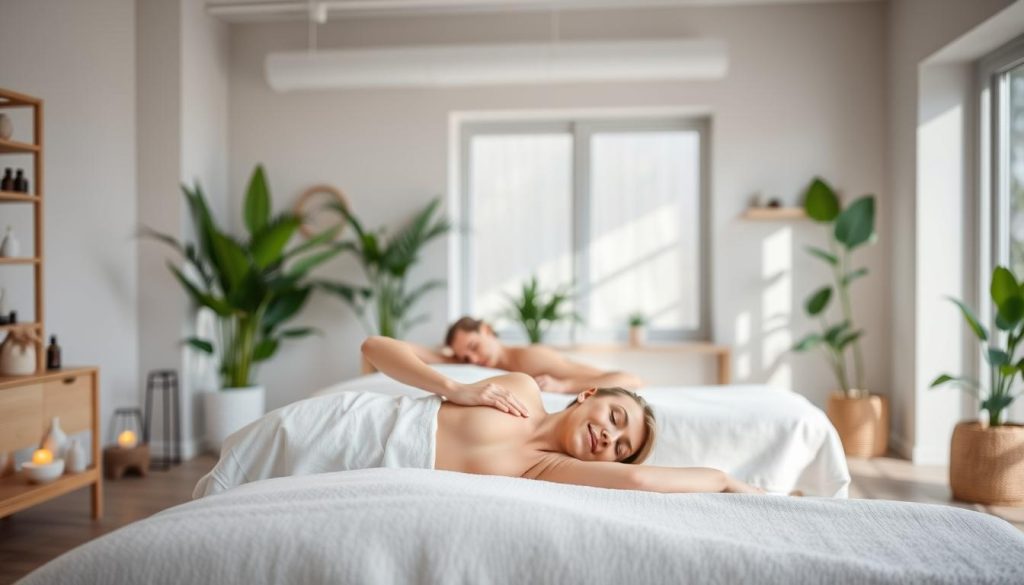
Alternative Medicine and Massage: 5 Ways to Relax Without Medication
Starting a journey toward *holistic healing* changes your life, especially with *alternative stress relief*. Adding *natural medicine* to your life works wonders. Acupuncture makes your body’s energy flow better, cutting stress and calming you down. Also, *herbal remedies* like teas from lavender and chamomile can relax your mind.
Massage therapy makes relaxation even better. Getting massages regularly boosts oxytocin and cuts cortisol, which reduces stress. Adding yoga to the mix helps even more with stress and makes you feel good, thanks to its proven benefits.
Dancing or brisk walking for 150 minutes weekly is great, as the CDC suggests. It lowers anxiety and lifts your mood. Sticking to this helps you stay active and adds to your *holistic healing* journey. A study showed students doing aerobic exercises felt less stressed after 6 weeks.
The *alternative stress relief* massages offer can improve your health a lot. Regular massages lower stress hormone by 31%, better sleep for 63% of people, and ease chronic pain. This boosts your physical health a lot. You can find more on how massages benefit health here.
Choosing acupuncture, herbal teas, or yoga means picking practices filled with *natural medicine*. These methods don’t just address symptoms but tackle the root causes of stress. This way, they help relax your body, mind, and spirit in a complete way.
Visualization and Deep Breathing Techniques
Relaxation methods help you fight stress. Using visualization and deep breathing can help lower stress quickly and over time. They’re easy to use and powerful in your day-to-day life.
How Visualization Reduces Stress
With visualization, you imagine peaceful scenes or positive outcomes. This shifts your focus from stress. It’s like creating a calm place in your mind, which helps you relax.
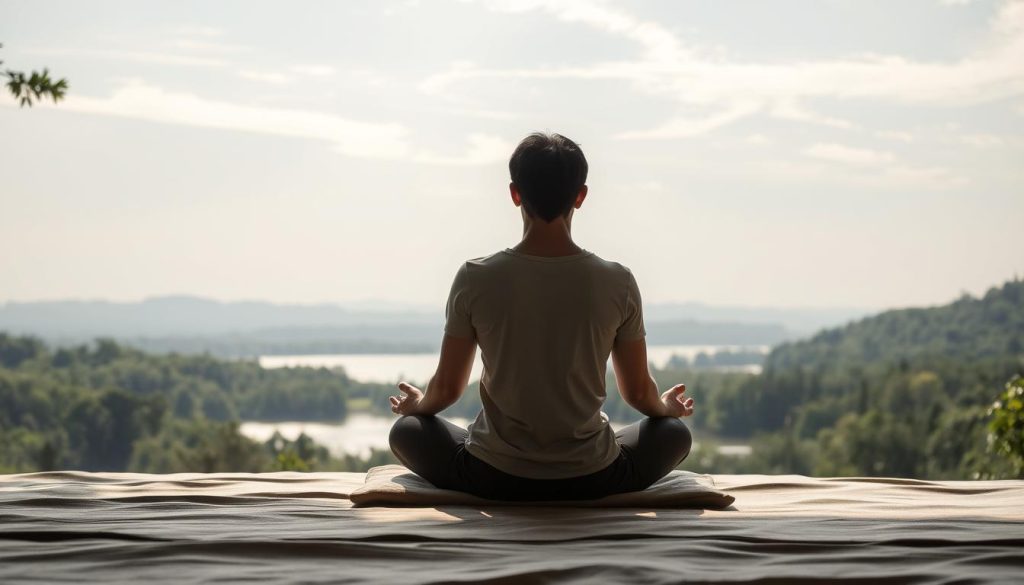
Deep Breathing Exercises
Deep breathing is great for feeling calmer. Practices like diaphragmatic breathing slow your heartbeat and reduce blood pressure. It involves breathing with your diaphragm, not your chest, for deeper breaths.
Sit comfortably and close your eyes. Put one hand on your chest and the other on your abdomen. Inhale deeply through your nose, making sure your abdomen rises more than your chest. This shows you’re breathing deeply. Exhale slowly through your mouth, letting go of stress. Doing this regularly helps you right away and improves your health over time.
Find more about natural ways to lessen stress in this post about natural solutions to stress.
“Deep breathing exercises slow the heart rate and lower blood pressure, making these practices effective for immediate stress relief.”
Using visualization and deep breathing together is a great way to handle stress. Add them to your daily routine to feel better and improve your mental health.
Impact of Exercise and Outdoor Activities on Stress Levels
Regular physical activity and outdoor experiences greatly improve your health. These activities help reduce stress by combining exercise with nature’s calm. This mix sharply lowers anxiety and boosts your mental health.
Benefits of Physical Activity
Exercise does more than just make you physically fit. It cuts down stress and makes you happier by releasing ‘feel-good’ hormones. It makes your heart healthy and strengthens your muscles too.
Spending Time in Nature
Being outside in nature deeply benefits your mental health. Activities like hiking or relaxing in a park make you feel better and less anxious. Nature’s quiet beauty, fresh air, and soothing sounds lower stress and improve mental well-being.
| Benefits of Exercise | Outdoor Activities for Stress | Nature and Mental Health |
|---|---|---|
| Improves cardiovascular health | Reduces anxiety levels | Enhances mood |
| Boosts endorphin levels | Provides fresh air exposure | Offers serene landscapes |
| Increases muscle strength | Promotes physical wellness | Soothes the mind |
Importance of a Balanced Diet for Mental Health
Eating right is key to feeling happy and less stressed. Eating a variety of healthy foods gives your body the nutrients it needs. This includes fruits, veggies, lean meats, and whole grains. They all help your brain work better and keep anxiety at bay.
Having a balanced diet is great for your mind. Foods full of nutrients make your gut healthy, which makes you feel good. Vitamins and minerals can also lower stress effects. So, what you eat really affects your mental health.
Research shows that eating well is not just good for your body but also for your mind. You can read more about living healthy and the role of diet here.
If you’re feeling stressed or anxious, knowing how food helps is important. Eating right plus doing things like getting massages can make you happier by boosting serotonin. To see how massage helps your mood, read this guide.
| Food Group | Mental Health Benefit |
|---|---|
| Fruits and Vegetables | Rich in vitamins and minerals that boost mood |
| Whole Grains | Furnish steady energy and regulate stress hormones |
| Lean Proteins | Provide amino acids that support neurotransmitter function |
| Healthy Fats | Improve brain health and reduce inflammation |
Choosing foods from these groups makes you healthy both outside and inside. This diet helps you handle stress better and boosts your happiness. The advantages of eating well are clear for living a good life.
Mindfulness and Meditation Practices
Adding mindfulness and meditation to your daily life can make you much happier and more relaxed. We’ll look at why mindfulness matters and how different meditation types can help.
Mindfulness for Stress Reduction
Mindfulness means living in the now, accepting your thoughts and feelings. It helps a lot with stress, by making you less anxious and more emotionally strong. One good way is mindful breathing, where you pay attention to your breath, which helps your mind relax.
You can learn about adding mindfulness to your life by checking out this mindfulness technique guide.
Types of Meditation
There are many ways to meditate, and finding the right one can make a big difference. Here are some types:
- Guided Meditation: You follow a guide or listen to instructions that help you visualize or relax.
- Focused Meditation: You focus on something specific like an object, sound, or idea. It helps improve your focus and thinking.
- Movement-Based Meditation: This includes activities like yoga or tai chi, combining movement with thoughtful focus for mental and physical perks.
Trying different meditation styles helps you find what works for you. Adding them to your life can lower stress and improve your mental health.
For tips on meditation and finding what suits you best, follow the guide linked here.
Conclusion
Trying new ways to relax can greatly improve your health. This includes methods like Swedish massage, visual exercises, moving your body, and staying mindful. Making these part of your everyday life takes care of both your mind and body. This balance is key to a healthier life.
Swedish massage does wonders for both the body and mind. It loosens tight muscles and boosts blood flow, while also calming the mind and making you happier. Research shows it works well. For example, it helps new moms sleep better and feel less sad when combined with nice smells. Having massages often can make you feel better overall. If you’re in İstanbul and want to try, check out expert massages here.
Adding these steps to your day helps you stay well for the long haul, without meds. Doing things outside, breathing deeply, or getting a calming massage are all good ways to deal with stress. These changes lead to a brighter, more chilled future.
